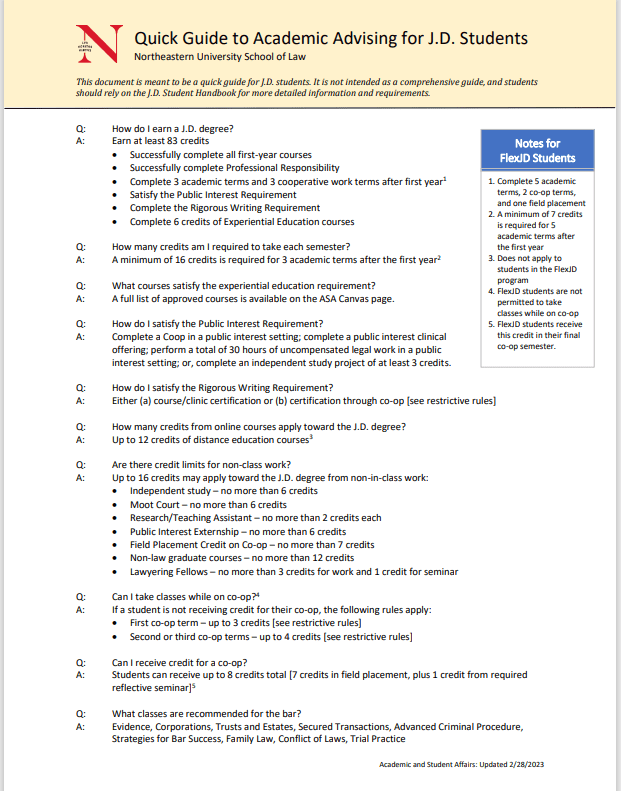Academic Advising
Please note that while these advising pages provide guidance and information, all official rules and regulations are detailed in the program specific Student Handbooks. In case of any discrepancies, the Student Handbooks take precedence over the information on these pages. It is essential to consult the Handbooks for the most accurate and authoritative guidelines.
JD Program Requirements for Graduation
- 83 total credits
- 34 first-year credits
- 49 credits in at least three upper-level academic terms
- To gain the remaining 49 credits in three terms, students must complete an average of 16.33 credits per term.
- Students who complete credit for co-op receive 8 total credits, bringing their remaining total credits to 41. To gain the remaining 41 credits in three terms, students must complete an average of 13.67 credits per term.
- 3 co-ops in a legal setting (fall-start transfer students need 2 co-ops)
- FlexJD co-op Requirements
- Upper-Level Rigorous Writing Requirement:
- All JD students must fulfill the Upper-Level Rigorous Writing Requirement. There are specific deadlines you need to be aware of for the Upper-Level Rigorous Writing Requirement. Students can read the rule outlining the requirements and the deadlines here.
- To have a piece of writing evaluated to fulfill this graduation requirement, please submit the Upper-Level Rigorous Writing Requirement Form. You may use writing from a class, clinic, or co-op. Please feel free to redact sensitive client information, as necessary.
- Public Interest Requirement
- Please complete the Public Interest Requirement Completion Form: Pro Bono or Directed Study Option if you did not fulfill the Public Interest Requirement with a Co-op or a Clinic.
- Required Upper-Level Courses:
- Professional Responsibility
- 6 credits of Experiential Education Courses:
- At the start of each academic year, in consultation with the faculty, the Associate Dean for Academic Affairs shall designate a list of experiential education courses to be offered to either first year or upper level students. In designating such courses, the Associate Dean for Academic Affairs and the faculty shall review the criteria set forth in ABA Standards 303, 304 and 305 to determine whether a course qualifies as an experiential education course.
- All candidates for the J.D. degree shall be required to complete a minimum of 6 credits from the list of experiential education courses so designated by the Associate Dean for Academic Affairs.
*Please note: You may NOT use the same course to satisfy both the Experiential Education Requirement and the Upper-Level Writing Requirement. Meaning, you may not use a paper written in a course for your Experiential Education Requirement to also satisfy your Upper-Level Writing Requirement.
Student Handbooks
Quick Guide to Academic Advising for J.D. Students

Transfer Credit
Students are able to enroll in courses from other law schools with prior approval from ASA that the course will count toward your JD at NUSL. It is required for any course to be pre-approved to be eligible to be transferred back to a student’s NUSL transcript upon completion. It is important to note that students are responsible for registration and full tuition to enroll in any course offered by another law school. If you are receiving financial aid, students are only able to receive financial aid for attendance to one higher education institution. Furthermore, if a student under-enrolls at NUSL because they are enrolling in a course at another Boston area law school, they will need to complete an under-enrollment form at NUSL. Please contact Matt Podgurski at m.podgurski@northeastern.edu with any questions.